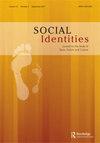民族现实的社会建构:台湾、西藏与香港
IF 0.7
Q3 ETHNIC STUDIES
引用次数: 0
摘要
“国家现实的社会建构:台湾、西藏和香港”是对国家认同、权力和代表性之间复杂关系的全面而深刻的探索。作者余福来(Fu-Lai Yu)和关颖珊(Diana Kwan)细致入微地分析了这些地区内外的不同角色如何塑造和争论人们对台湾、西藏和香港的认知和理解。作者借鉴了一系列的资料来源,包括采访、媒体分析和政治话语,对不同话语框架和政治现实之间复杂的相互作用提供了细致入微的理解。作者运用彼得·伯杰关于现实的社会建构理论,探讨了国家认同的形成和国家建构的过程,探讨了通过日常生活经验的社会化如何培育群体内与群体外的区别,区分国民与非国民。利用这一理论,作者希望对台湾海峡危机、西藏动乱、香港雨伞运动等因民族意识分歧而产生的国际冲突提供深刻的见解。这本书的核心是批判性地审视了权力和代表的日常经历是如何交织在一起的。余福来和关颖珊通过托马斯·卢克曼和彼得·伯杰(1967)的《社会建构理论》审视了国家认同的建构。“Yu和Kwan通过主体间主义的方法,对国家身份建构的历史、意识形态和政治基础的本质提供了生动的见解,非常引人注目。”他们追溯了西藏、台湾和香港的民族认同的历史起源,包括中国大陆的人民,并分析了促成民族认同建构的历史和当代原因。作者Yu和Kwan认为,国家身份是通过个人和机构的行动构建的,而个人和机构有能力塑造国家身份本文章由计算机程序翻译,如有差异,请以英文原文为准。
Social Construction of National Reality: Taiwan, Tibet and Hong Kong
The ‘ Social Construction of National Reality: Taiwan, Tibet, and Hong Kong ’ is a comprehensive and insightful exploration of the complex relationships between national identity, power, and representation. Authors Fu-Lai Yu and Diana Kwan provide a nuanced analysis of how di ff erent actors, both within and outside of the territories in question, shape and contest how Taiwan, Tibet, and Hong Kong are perceived and understood. The authors draw upon a range of sources, including interviews, media analysis, and political discourse, to provide a nuanced understanding of the complex interplay between di ff erent discursive frameworks and political realities. The authors leverages Peter Berger ’ s theory on the social construction of reality to explore the formation of national identity and the nation-building process and delve into how socialization through everyday life experiences cultivates ingroup and outgroup distinctions, separating nationals and non-nationals. By utilizing this theory, the authors aim to provide insight into the inter-national con fl icts, including the Taiwan Strait Crisis, Tibetan unrest, and the Hong Kong Umbrella Movement, that have arisen due to divergent national consciousnesses. At its core, this book critically examines how everyday experiences of power and representation are intertwined. Tony Fu-Lai Yu and Diana S. Kwan examine the construction of national identity through the lens of Thomas Luckmann and Peter Berger ’ s (1967) ‘ Social Construction Theory. ’ Yu and Kwan provide vivid insights into the nature of historical, ideological as well as political bases of the construction of national identities through an intersubjectivist approach, which is very compelling. They trace the historical origin of national identity in Tibet, Taiwan, and Hong Kong, including among the people of mainland China and analyze the historical as well as contemporary reasons that contribute to the construction of the national identity. The authors Yu and Kwan argue that national identities are constructed through the actions of individuals and institutions that have the power to shape
求助全文
通过发布文献求助,成功后即可免费获取论文全文。
去求助
来源期刊

Social Identities
ETHNIC STUDIES-
CiteScore
2.00
自引率
0.00%
发文量
22
期刊介绍:
Recent years have witnessed considerable worldwide changes concerning social identities such as race, nation and ethnicity, as well as the emergence of new forms of racism and nationalism as discriminatory exclusions. Social Identities aims to furnish an interdisciplinary and international focal point for theorizing issues at the interface of social identities. The journal is especially concerned to address these issues in the context of the transforming political economies and cultures of postmodern and postcolonial conditions. Social Identities is intended as a forum for contesting ideas and debates concerning the formations of, and transformations in, socially significant identities, their attendant forms of material exclusion and power.
 求助内容:
求助内容: 应助结果提醒方式:
应助结果提醒方式:


